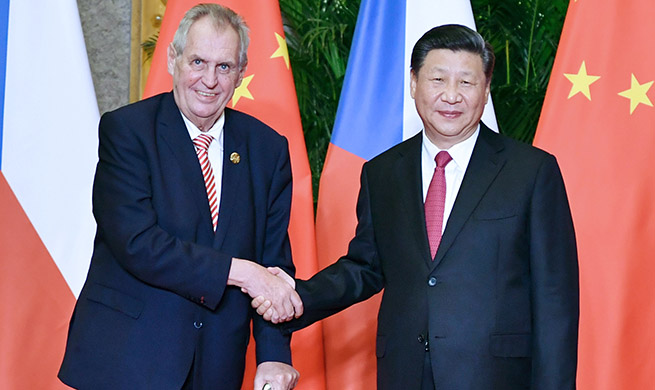WASHINGTON, Nov. 5 (Xinhua) -- International Monetary Fund (IMF) chief Christine Lagarde on Monday called for efforts to create a more inclusive type of multilateralism so as to "avoid replaying the discordant notes of the past."
Lagarde made the appeal in a blog post on the official website of the global financial institution, days before a scheduled gathering of world leaders in Paris to commemorate the 100th anniversary of the end of World War I (WWI), which falls on Nov. 11.
Highlighting remarkable technological advancement and global integration as the twin forces that have for centuries created great wealth, Lagarde said while these forces "have the prospect to drive prosperity across nations," they can also, if mismanaged, potentially provoke calamity, of which WWI is "a searing example."
She went on to say that the uneven and unfair distribution of wealth across the world resulted in "an era of massively rising inequality" in the lead-up to WWI, one that was featured by "the dark and dangerous factories and the robber barons."
"Countries responded by scrambling for national advantage, forsaking the idea of mutual cooperation in favor of zero-sum dominance. The result was catastrophe-the full weight of modern technology deployed toward carnage and destruction," she said.
The IMF chief said that countries fighting the war failed to draw the correct lessons from it, and that it was only after World War II (WWII) that international mechanisms such as the United Nations, the World Bank and the IMF were established "to find more durable solutions to our shared problems."
The system created after WWII, Lagarde added, was always meant to be able to adapt, recognizing that global cooperation must evolve to survive.
As the world is experiencing "striking similarities" with the pre-WWI era and once again has to adapt to "rising anger and frustration combined with a backlash against globalization," the head of the international lender called for the creation of a new type of multilateralism, "one that is more inclusive, more people-centered, and more accountable."
"This new multilateralism must reinvigorate the previous spirit of cooperation while also addressing a broader spectrum of challenges-from financial integration and fintech to the cost of corruption and climate change," she said.
She urged every leader and citizen to take due responsibility to contribute new ideas on rebuilding a better international governance system.
Lagarde first put forward the notion of "new multilateralism" in a speech she delivered during the IMF and World Bank annual meetings in Bali, Indonesia in October.
She said then that the new multilateralism endeavors to de-escalate international trade disputes, address global imbalances, and tackle rising debt vulnerability by forging cooperation to fix the current system rather than to tear it apart.













